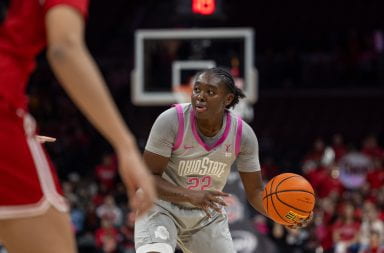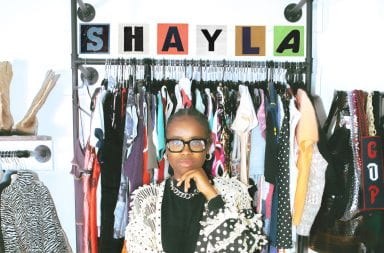
A volunteer with the KindCarts Service Initiative works on a craft project to be donated to the James Cancer Hospital. Credit: Courtesy Ana Sucaldito
While some students who want to help fight cancer might turn to a career in medicine, others are working to to sew pillows and make paper flowers for patients.
Two years ago, Ana Sucaldito, a fourth-year in neuroscience, started the KindCarts Service Initiative, with the hope of using homemade crafts to bring a small bit of comfort and joy to patients at the James Cancer Hospital.
“There’s little morale-building things that you can do with the patients,” Sucaldito said. “We can’t take away physical pain, but we can make them a little more comfortable.”
Sucaldito said she started the KCSI after she volunteered with the Restful Nights program at the James, delivering items such as crossword puzzles and earplugs to patients to help them relax and have a peaceful night’s sleep.
“(Sucaldito) really saw the need for an additional way to brighten people’s spirits,” said Katie Kiene, a program manager with volunteer services for the James. “She really identified that (it) could be achieved through craft items that just might be something that the patient could do to pass time or something small that might bring a smile to their face.”
Sucaldito said she came up with the idea to make crafts for patients after she had talked with some who were sad they couldn’t participate in seasonal traditions with their families, such as picking pumpkins in the fall.
“So, the first thing we did was make paper pumpkins,” Sucaldito said. “We decorated them and then put them out in the hall so (patients) could pick pumpkins.”
From there, Sucaldito provided more crafts, including hand-sewn neck pillows, crocheted stress balls — or what she calls “no-stress-monsters” — and paper flowers.
Neck pillows are especially popular right now, Sucaldito said, because the James doesn’t have enough extra pillows. As a result, the pillows created by Sucaldito and her fellow volunteers are quickly taken by patients.
Since real flowers and plants can potentially interfere with cancer treatment, they are not allowed at the cancer center. Sucaldito and her volunteers make origami tulips and “hope gardens” that families can take to their loved ones in the hospital instead.
Since its conception, KCSI has expanded to include 15 regular volunteers who have made nearly 2,000 crafts to be donated to the James Cancer Hospital, Sucaldito said.
Bernadette Dezso, a second-year in neuroscience who volunteers with KindCarts, said she thinks the little things the group does can go a long way.
“My favorite part is being with people who like to help out others and making different things for these patients at the James,” Dezso said. “We all know that this might be the hardest time during (patients’) lives, and it might not make a huge difference, but it might brighten a little moment in their life.”
KSCI’s volunteers gather weekly in informal settings to make their crafts. Additionally, Sucaldito partners with various organizations on campus to explain the importance of empathy while caring for patients in a hospital setting, as well as guide them through making simple craft projects.
“I don’t think service always has to be in a traditional way,” Sucaldito said. “Those traditional ways of service are super important, but you can easily make a card out of scrap paper … or you can donate a ball of yarn. It doesn’t have to be this clear-cut way — you can figure out your own way to do service.”
The Engaged Scholars logo accompanies stories that feature and examine research and teaching partnerships formed between the Ohio State University and the community (local, state, national and global) for the mutually beneficial exchange of knowledge and resources. These stories spring from a partnership with OSU’s Office of Outreach and Engagement. The Lantern retains sole editorial control over the selection, writing and editing of these stories.



